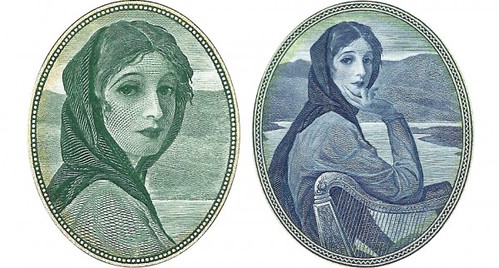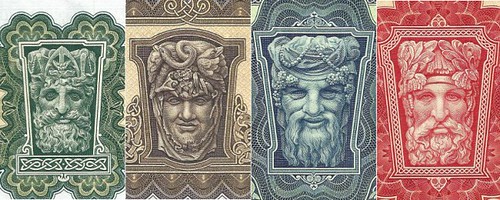
PREV ARTICLE
NEXT ARTICLE
FULL ISSUE
PREV FULL ISSUE
THE IRISH LADY LAVERY BANKNOTES OF 1928-1977
An article by Dennis Hengeveld published August 3, 2015 on Coin Update offers a look at some interesting Irish banknotes.
Here's an excerpt. -Editor

World paper money is an area of numismatics that has seen a substantial increase in interest over the last couple of years. With a rich history going back to the 14th century, this should not come as a surprise. Paper money collectors have a wide variety of possibilities available to them, and their collections can be organized by country, theme, and even material. In this article, we will take a look at one long-running series of paper money that is popular with collectors worldwide: the Irish Lady Lavery, or “Series A” Legal Tender Notes of 1928 to 1977. Following the establishment of the Irish Free State in 1922 and the enactment of the Currency Act in 1927, Lady Lavery banknotes were issued in a total of seven denominations; each had a slightly different design containing either a head portrait (10 Shillings, 1 Pound, and 5 Pound) or a half-length portrait (10 Pounds, 20 Pounds, 50 Pounds, and 100 Pounds) of Lady Hazel Lavery. Born in Chicago on March 14, 1880 as Hazel Martyn, Lady Lavery was the second wife of portrait artist Sir John Lavery. John Lavery designed this long-running series of banknotes using the portrait of his wife as an allegorical representation of Ireland. 
The back of the Lady Lavery banknotes feature designs that at first glance may appear identical, but are not. Centered in an ornamental design is a so-called River Mask, which can be found on the façade of the Dublin Custom House. The masks represent various rivers in Ireland, and were designed by the sculptor Edward Smythe. Initially the notes were printed by the London firm of Waterlow & Sons; later they were printed by Thomas De La Rue. 
The notes were introduced by the Currency Commission of the Irish Free State on September 10, 1928, which is the first date for all denominations. From 1938 to 1943, the notes were issued by the Currency Commission of Ireland, after which the newly created Central Bank of Ireland took control of their production. Initially, the notes circulated alongside so-called consolidated banknotes, which were issued by commercial banks throughout Ireland under the auspices of the Currency Commission. These consolidated banknotes (also called Ploughman Notes) were withdrawn from circulation starting in 1953, when the Lady Lavery Banknotes became the only circulating banknotes in Ireland. To read the complete article, see:
Wayne Homren, Editor The Numismatic Bibliomania Society is a non-profit organization promoting numismatic literature. See our web site at coinbooks.org. To submit items for publication in The E-Sylum, write to the Editor at this address: whomren@gmail.com To subscribe go to: https://my.binhost.com/lists/listinfo/esylum All Rights Reserved. NBS Home Page Contact the NBS webmaster 
|